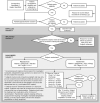Aspirin and left ventricular assist devices: rationale and design for the international randomized, placebo-controlled, non-inferiority ARIES HM3 trial
- PMID: 34142415
- PMCID: PMC8361946
- DOI: 10.1002/ejhf.2275
Aspirin and left ventricular assist devices: rationale and design for the international randomized, placebo-controlled, non-inferiority ARIES HM3 trial
Abstract
Aims: Over decades, left ventricular assist device (LVAD) technology has transitioned from less durable bulky pumps to smaller continuous-flow pumps which have substantially improved long-term outcomes and quality of life. Contemporary LVAD therapy is beleaguered by haemocompatibility-related adverse events including thrombosis, stroke and bleeding. A fully magnetically levitated pump, the HeartMate 3 (HM3, Abbott, USA) LVAD, has been shown to be superior to the older HeartMate II (HMII, Abbott, USA) pump by improving haemocompatibility. Experience with the HM3 LVAD suggests near elimination of de-novo pump thrombosis, a marked reduction in stroke rates, and only a modest decrease in bleeding complications. Since the advent of continuous-flow LVAD therapy, patients have been prescribed a combination of aspirin and anticoagulation therapy on the presumption that platelet activation and perturbations to the haemostatic axis determine their necessity. Observational studies in patients implanted with the HM3 LVAD who suffer bleeding have suggested a signal of reduced subsequent bleeding events with withdrawal of aspirin. The notion of whether antiplatelet therapy can be avoided in an effort to reduce bleeding complications has now been advanced.
Methods: To evaluate this hypothesis and its clinical benefits, the Antiplatelet Removal and Hemocompatibility Events with the HeartMate 3 Pump (ARIES HM3) has been introduced as the first-ever international prospective, randomized, double-blind and placebo-controlled, non-inferiority trial in a patient population implanted with a LVAD.
Conclusion: This paper reviews the biological and clinical role of aspirin (100 mg) with LVADs and discusses the rationale and design of the ARIES HM3 trial.
Trial registration: ClinicalTrials.gov NCT04069156.
Keywords: Advanced heart failure; Aspirin; Assist devices; Bleeding; Hemocompatibility; LVAD; Mechanical Circulatory Support; Outcomes.
© 2021 The Authors. European Journal of Heart Failure published by John Wiley & Sons Ltd on behalf of European Society of Cardiology.
Figures


References
-
- Sidhu K, Lam PH, Mehra MR. Evolving trends in mechanical circulatory support: clinical development of a fully magnetically levitated durable ventricular assist device. Trends Cardiovasc Med 2020;30:223–229. - PubMed
-
- Pinney SP, Anyanwu AC, Lala A, Teuteberg JJ, Uriel N, Mehra MR. Left ventricular assist devices for lifelong support. J Am Coll Cardiol 2017;69:2845–2861. - PubMed
-
- Mehra MR. The burden of haemocompatibility with left ventricular assist systems: a complex weave. Eur Heart J 2019;40:673–677. - PubMed
-
- Mehra MR, Naka Y, Uriel N, Goldstein DJ, Cleveland JC Jr, Colombo PC, Walsh MN, Milano CA, Patel CB, Jorde UP, Pagani FD, Aaronson KD, Dean DA, McCants K, Itoh A, Ewald GA, Horstmanshof D, Long JW, Salerno C; MOMENTUM 3 Investigators . A fully magnetically levitated circulatory pump for advanced heart failure. N Engl J Med 2017;376:440–450. - PubMed
-
- Mehra MR, Goldstein DJ, Uriel N, Cleveland JC Jr, Yuzefpolskaya M, Salerno C, Walsh MN, Milano CA, Patel CB, Ewald GA, Itoh A, Dean D, Krishnamoorthy A, Cotts WG, Tatooles AJ, Jorde UP, Bruckner BA, Estep JD, Jeevanandam V, Sayer G, Horstmanshof D, Long JW, Gulati S, Skipper ER, O'Connell JB, Heatley G, Sood P, Naka Y; MOMENTUM 3 Investigators . Two‐year outcomes with a magnetically levitated cardiac pump in heart failure. N Engl J Med 2018;378:1386–1395. - PubMed

